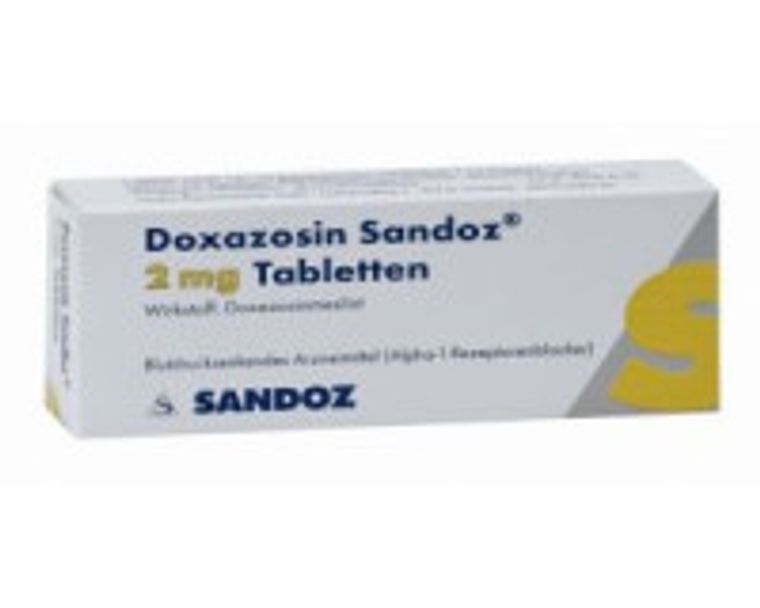Doxazosin is a medication that belongs to a class of drugs known as alpha-blockers. It works by relaxing the muscles in your prostate and bladder neck, making it easier for you to urinate. This medication is commonly used to treat high blood pressure (hypertension) and symptoms of benign prostatic hyperplasia (enlarged prostate). Doxazosin's active ingredient helps dilate blood vessels, improving blood flow and lowering blood pressure. It is suitable for individuals with hypertension or enlarged prostate.

Description
Dosage and usage
You should take Doxazosin exactly as prescribed by your doctor. The typical starting dose is 1 mg once daily, usually at bedtime to minimize the risk of dizziness. Your doctor may gradually increase your dose to achieve the desired blood pressure control. The maximum recommended dose is 16 mg daily. If you miss a dose, take it as soon as you remember. If it is near the time of your next dose, skip the missed dose. Do not double the dose to catch up. If you experience prolonged dizziness or lightheadedness, contact your doctor promptly.
What Doxazosin contains
Each Doxazosin tablet contains 1 mg of doxazosin mesylate as the active ingredient. The tablet also includes excipients such as lactose, magnesium stearate, microcrystalline cellulose, and sodium starch glycolate.
Side effects
Common side effects of Doxazosin may include dizziness, drowsiness, fatigue, headache, and swelling in your hands or feet. Serious side effects that require immediate medical attention include fainting, irregular heartbeat, and shortness of breath. If you experience prolonged and painful erections (priapism), seek medical help right away.
Precautions
Do not take Doxazosin if you are allergic to doxazosin or similar medications. Inform your doctor of any medical conditions you have, especially liver disease or prostate cancer. Avoid activities requiring mental alertness until you know how this medication affects you. If you have heart conditions or are taking medications like blood pressure-lowering drugs or phosphodiesterase type 5 inhibitors, consult your doctor before using Doxazosin.
Package leaflet
Read the package leaflet before use.
Highly recommended
I have been a customer of Doctoronline for many years and have always found them reliable and professional in handling my orders.They provide an important service with quality products at reasonable prices with excellent customer service before, during and after sales.Highly recommended
Easy to navigate and prompt service.
Easy to navigate and prompt service.
Allways use as its so easy to fill in…
Allways use as its so easy to fill in the questionnaire Fast post Any questions you can ask the doctors I use them every month
I had consultation for acne issues
I had consultation for acne issues, resolved with no issues, saving me and the nhs time and money.
I have suffered with restless legs for…
I have suffered with restless legs for years and have never had any help from my doctor.Doctoronline prescribed some medication and I’m able to sleep without having that horrible feeling in my legs thank you I recommend 100% what ever your problem is they will do their best to help you
Very good service all round
Very good service all round, thank you.
Profesional help and fast delivery
Profesional help and fast delivery . High recommended
An excellent experience.
This was an excellent experience which actually surpassed my expectations.I required a medication fairly urgently and probably just a one off however I will have no hesitation in using the service again if need be.The service was exceptionally good, courteous and helpful. My meds arrived very rapidly and I was able to fully track the delivery progress which was via a well established courier company.Highly recommend.
Quick and straightforward assessment
Quick and straightforward assessment, easy to order, fast delivery service, ability to ask questions via email, regarding the medication you’ve ordered. The only thing I was slightly disappointed with, was when I made my second order on the medication I previously purchased, as the price went up by almost £10.
Great service
Fast, efficient service with no issues.
The best pharmacy online
The best pharmacy online
Very efficient service
Very efficient service. Made accessing healthcare and treatment easier than accessing GP services.
Easy to use and quick deliver
Easy to use and quick deliver
Excellent 1st class service
Excellent 1st class service. I could find the product I needed, placed the order, and after the swift consultation, the product was sent fast and securely. I would recommend.
Always reliable
Always reliable, smooth service. Happy with products and super fast delivery. 5 stars as always!
fantastic service from doctor online,my…
fantastic service from doctor online,my prescription was processed and delivered very quickly
No issues
No issues. Speedy service. Would use again
Genuine platform
I was skeptical to see another platform with doctors services as I was scammed in past.I have spoken to customer service multiple time( they answered all my concerns) and later on decided to place an order, my inquiry was dealt with it professionally, timely and accurate. I can recommend.
Good service and fast delivery
Good service and fast delivery
The medicine is helpful
The medicine is helpful



